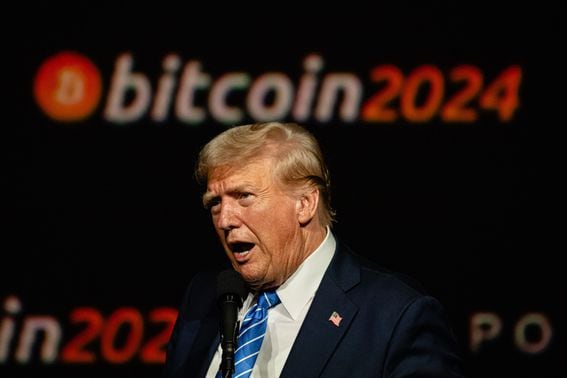
Can a Strategic Bitcoin Reserve Move Forward Without Congress?
The U.S. government currently possesses over 208,000 bitcoins, raising questions about the management and retention of this asset.
Key Points:
- Then-candidate Donald Trump pledged to halt the sale of seized bitcoin in July.
- Experts suggest the incoming administration may need Congressional support to properly establish a strategic reserve.
- Despite Republican majorities in Congress, setting up a bitcoin reserve is not anticipated to be a priority.
 Donald Trump
Former U.S. President and now President-elect Donald Trump (Jon Cherry/Getty Images).
Donald Trump
Former U.S. President and now President-elect Donald Trump (Jon Cherry/Getty Images).
Trump stated in his Nashville speech this summer that the government would retain all seized bitcoin moving forward.
Would the government merely cease the sale of its current bitcoin holdings, or would it pursue active acquisitions as suggested by Senator Cynthia Lummis and Trump ally Robert F. Kennedy?
The government retains a stockpile of bitcoin acquired through asset seizures related to criminal activity. Historically, these bitcoins were sold at auctions, but Trump indicated a policy change last July, suggesting that the government would retain all existing and future bitcoins acquired.
Coordination Challenges
Implementing such a policy involves complex coordination among various government agencies, including the Department of Justice and the U.S. Treasury. Perianne Boring, CEO of The Digital Chamber, expressed skepticism about the practicalities of this policy.
Moish Peltz noted that the protocols for handling seized bitcoins might differ depending on how they were obtained, and while some instances may require Congressional approval, it is not a general rule.
Alternative Strategies
Senator Lummis advocates for selling a portion of the U.S.’s gold reserves to acquire more bitcoins proactively, a plan estimated to require over $90 billion at current market rates.
While some experts believe executive orders could initiate these strategies, significant financial allocations typically necessitate Congressional approval.
Zack Shapiro proposed that the Treasury could leverage the Exchange Stabilization Fund to indirectly acquire bitcoin while avoiding direct market interventions.
In summary, the establishment of a strategic bitcoin reserve by the U.S. government hinges on both legal and legislative factors, with various expert opinions highlighting the complexities involved.


